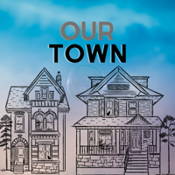
Overview
Synopsis
A landmark in American drama, Thornton Wilder’s Pulitzer Prize-winning Our Town tells the story of a small town, Grover’s Corners, New Hampshire, in order to tell us the story of every town, the whole world over. Narrated by the “Stage Manager”, we follow the Gibbs and Webb families, residents of Grover’s Corners, through twelve years of life changes -- from the mundane in Act I, “Daily Life,” to the romantic in Act II, “Love and Marriage,” to the devastating in Act III, “Death and Eternity.” Through the young lovers Emily and George, their strong and loving parents, and the many other Grover’s Corners’ locals, Wilder delivers universal truths about what it means to be human. “Oh, earth,” Emily Webb exclaims towards the play’s end, “you’re too wonderful for anyone to realize you.” With humor, wit, and exceptionally powerful storytelling, Our Town offers a unique opportunity for audience members to make precisely that realization.
Show Information
Context
Thornton Wilder was originally a Pulitzer Prize-winning novelist, but critics argued that his work was escapist fare that did little to confront the enormous issues of the Depression era. In response, Wilder turned to playwriting. His first play, Our Town, opened on Broadway in 1938 to rave reviews and eventually won him his second Pulitzer Prize. However, unlike the many plays of the time that took a cynical look at American life, Wilder’s Our Town instead embraced the nature of small town
to read the context for Our Town and to unlock other amazing theatre resources!Plot
Act One - Daily Life
The play begins with an open, empty space. The Stage Manager enters and rearranges a few pieces of furniture -- a table and three chairs -- as the lights dim. Once the theatre is completely dark, the Stage Manager sets the scene: “This play is called ‘Our Town...’ The name of the town is Grover’s Corners, New Hampshire… The day is May 7, 1901. The time is just before dawn.” He introduces the customs and landmarks of the town, concluding by informing the audience that
to read the plot for Our Town and to unlock other amazing theatre resources!Characters
| Name | Part Size | Gender | Vocal Part |
|---|---|---|---|
|
Lead |
Either Gender |
Spoken |
|
|
Lead |
Male |
Spoken |
|
|
Lead |
Female |
Spoken |
|
|
Supporting |
Male |
Spoken |
|
|
Supporting |
Female |
Spoken |
|
|
Supporting |
Male |
Spoken |
|
|
Supporting |
Female |
Spoken |
|
|
Featured |
Female |
Spoken |
|
|
Featured |
Male |
Spoken |
|
|
Featured |
Female |
Spoken |
|
|
Featured |
Male |
Spoken |
|
|
Featured |
Male |
Spoken |
|
|
Featured |
Male |
Spoken |
|
|
Featured |
Male |
Spoken |
|
|
Featured |
Male |
Spoken |
|
|
Featured |
Male |
Spoken |
|
|
Featured |
Male |
Spoken |
Songs
A song with an asterisk (*) before the title indicates a dance number; a character listed in a song with an asterisk (*) by the character's name indicates that the character exclusively serves as a dancer in this song, which is sung by other characters.
Monologues
Scenes
Key Terms
An actor plant is someone intentionally placed in the audience to influence reactions, often by laughing, applauding, or participating at key moments. This technique can heighten the energy of a performance or encourage genuine audience responses. It is sometimes used in marketing or immersive theatre.
The deliberate use of stylized, non-naturalistic elements in theatre to emphasize that the production is a constructed artistic creation.
Innovative performance styles that challenge traditional theatre conventions.
A form of self-referential drama where the play draws attention to its own theatricality. This device challenges the audience’s suspension of disbelief and is used in Epic Theatre and postmodern works.
A small-scale representation of a larger concept, often used in plays to explore universal themes through confined settings.
A theatrical style that emphasizes simplicity in staging and dialogue to focus attention on core themes and performance.
A narrative voice that knows all thoughts, actions, and events. Omniscient narration is used in epic theatre and storytelling to provide a broad, external perspective.
A performance style using exaggerated physical gestures and expressions rather than speech. Pantomime is a key component of Commedia dell’arte and children’s theatre.
A member of a Protestant sect that opposed theatre in 17th-century England. Their influence contributed to the temporary closure of theatres during that era.
A character or theme denoting impermanence, often used to explore societal change or alienation in drama.
Videos
Quizzes
Themes, Symbols & Motifs
Sorry! We do not currently have learning modules for this guide.
Quote Analysis
Sorry! We do not currently have learning modules for this guide.
